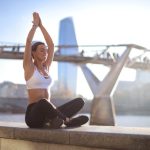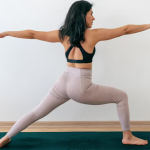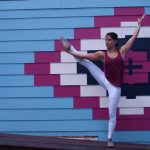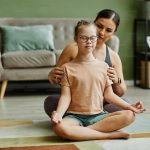One of our own – Peter Ogazi – trained with YogaLondon back in 2011. Currently a secondary school teacher as well, he’s taught a wide range of students since then through his business ‘yogazi’. He is a fighter for social justice, deeply chilled, strong, and, by his own admission, a private person. So we appreciate his chatting to us about all things yoga even more.
1. How did you get into yoga?
I’ve been a practitioner of yoga for a good twenty-odd years. I got into yoga because I was originally into martial arts and kickboxing, and someone from that world told me that yoga would improve my practice. So I went along to the Buddhist center in Manchester city centre and I found that not only did it improve my martial arts practice quite considerably, it also enhanced other aspect of my life too. So I started going quite regularly, till I noticed that I was more relaxed and that I had got rid of a hell of a lot of anger.
2. What prompted you to become a yoga teacher?
Encouraged by this I trained to become a teacher with YogaLondon in 2011. I think another thing that prompted me to become a teacher was that I felt there was a need for yoga in Afro-Caribbean and working communities. There’s a stereotypical idea of a yoga teacher that can put some people off. Personally, it’s never bothered me that on most occasions I’m the only person of colour at yoga events – it’s never made me feel uncomfortable. But there is a need for it to be spread out wider, so that’s maybe why I became a yoga teacher.
3. How has yoga changed you as a person?
Yoga has changed me quite considerably. I used to be quite an anxious person socially, but it helped me to chill out more and to be more comfortable in my own skin. When you’ve done yoga regularly for a long time and then you don’t do it, you realise that you’re missing it, and that’s when you know it’s having a positive effect.
4. What’s your home practice like?
My home practice is quite good. I’m quite regular with it. But, these days I don’t go at it like I did when I first qualified as a teacher. Back then I was doing it twice a day – I almost became a perfectionist. But it got to the point when I did have to cool down a little because I was becoming very, very tired. I still practice, but now it’s three or four times a week and not twice a day.
5. What type of yoga do you practice?
Recently I’ve been doing a lot of yin yoga and I’m really feeling the benefits of adding it to my practice. I’ve done a little bit of Iyengar, and from there I started doing Ashtanga yoga and that became my favourite, along with Vinyasa flow. I’ve done a little bit of hot yoga as well but I didn’t really take to that.
6. What would you still like to do with your yoga teaching?
Three years ago I set up a community interest company with the aim of spreading yoga to hard-to-reach groups, which I ran for about two years. Through this CIC I collaborated with the Manchester Mental Health & Social Care Trust and ran yoga classes for people with varying degrees of mental health problems, such as clinical depression, anxiety, and schizophrenia. I also worked with disadvantaged young people who were on the verge of social exclusion. Plus the Greater Manchester Fire Service as well. I also worked for Christie’s Hospital here in Manchester and taught yoga to people with various types of cancer.
I’m thinking of doing this again and sticking to it. In the last couple of years, I’ve been working at a secondary school and that’s taken up a lot of my time and I’ve had to cut down on my yoga classes and I knock CIC on the head. In the future, I can see myself going down that route again, and making it a lot more sustainable.
7. What are your yoga goals?
I’ve wanted to do a retreat for a while, but the only thing that’s put me off is that I’m quite a private person – I need my own space. I imagine being on a yoga retreat you’re around people 24/7 and you’re the centre of attention all the time. I could collaborate with other yoga teachers to make it work.
8. You’ve taught a wide range of students. How do you adapt your classes for less able students?
As soon as you walk into a room you get the energy. I’ve taught various groups, so for instance with a group of young people with learning difficulties I’m not going to be teaching an experienced ashtanga class, I’ll teach them some chair yoga, basic moves, and basic breath exercises.
When I teach boxers and martial artists they want more dynamic stuff and to keep on moving, I wouldn’t go in there and start singing Oms. You have to adapt each class to their particular needs.
9. What would your advice be to someone who’s thinking about becoming a yoga teacher?
To be very, very open-minded. To be clear and concise when you’re teaching, and not to make assumptions. Avoid what I call flimmy flammy language and make yourself understood. I also avoid music in classes because music is such a personal choice and can be quite off-putting.
And it can be quite hard and challenging. It’s not the stereotype of what a yoga teacher is, almost a permanent holiday with a smile on your face. But the rewards definitely outweigh the negatives.
10. How important is humour in yoga?
You have to have a sense of humour, most definitely! There’s a time and a place for things to be serious. It’s very, very important to have a sense of humour sometimes and not take things too seriously, particularly when you’re in an intimate space with people and everything’s quiet and then all of sudden maybe someone farts!
11. In your opinion, how can the yoga industry improve the representation of POC, both as teachers and students?
We need to show that it’s not just middle-class white women that do this. In magazines and general media, it would be very, very beneficial to have more representation out there as that attracts more people. As I’ve said before, just the fact that I’m teaching yoga attracts people. When I started teaching in a community centre up here I got a wide range of clients – not just people of colour, but from white working-class backgrounds – just the simple fact that I was a little bit different, and didn’t fit into the stereotype of what a yoga teacher should be, gave them the confidence to come to the class.
As well as that, we need more men doing yoga. A lot of men assume that yoga is just for women and I’ve had to break that stereotype down. When I taught male boxers and martial artists they thought was just going to be a ‘little stretch’ and after 20 minutes, I kid you not, they’re all crying and making all sorts of noises because they’re working muscles and ligaments that they’ve never worked before!
Also, a lot of men these days of a certain age don’t know where they are, and how they fit into the world. They’re quite angry as well, and yoga can be very, very beneficial in calming them down. A yoga class can offer them not only a sense of community but also offers balance and a way to chill out.
12. Describe what yoga means to you in three words.
It’s such an all-encompassing part of my life that it’s hard to think of three, but definitely relaxation, profound and chilled.
Check out Peter’s website at Yogazi













